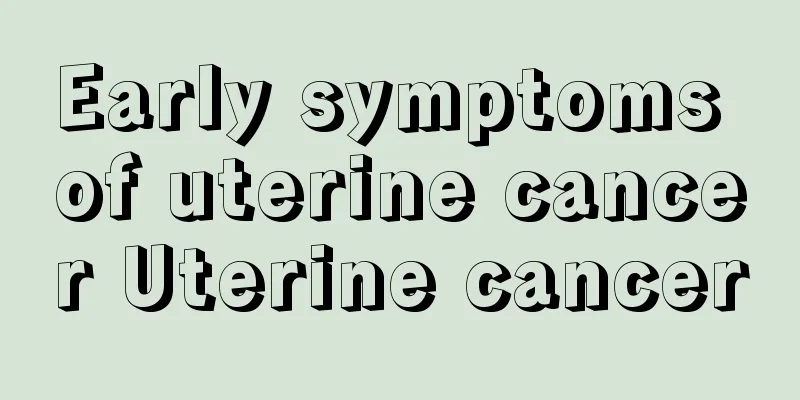Early symptoms of uterine cancer Uterine cancer

|
Early symptoms of uterine cancer usually include unexplained vaginal bleeding, abnormal menstrual cycles, and lower abdominal pain. These symptoms may be early warning signals from the body. It is recommended to seek medical attention as soon as possible to make a clear diagnosis and take intervention measures. Early screening and treatment can significantly improve the cure rate. 1. Unexplained vaginal bleeding The most common early sign of uterine cancer is irregular vaginal bleeding, especially in postmenopausal women. If you notice a significant increase in menstrual flow, prolonged menstrual period, or abnormal bleeding between periods, these are symptoms that need to be taken seriously. For women of childbearing age, bleeding after sexual intercourse may also be a warning sign. This bleeding may be related to early cancer cells invading endometrial tissue or blood vessels, so a gynecological examination should be performed as soon as possible, such as vaginal B-ultrasound or hysteroscopy. 2. Abnormal menstrual cycle Menstrual abnormalities are not only manifested in terms of flow, but also in cycle disorders. For women of childbearing age, if menstruation is frequently advanced or delayed for a period of time, and is accompanied by blood clots or dysmenorrhea, a variety of potential gynecological disease risks should be considered, including uterine cancer. Doctors will recommend taking endometrial tissue for biopsy, or performing uterine ultrasound to check for abnormal changes. 3. Lower abdominal pain and discomfort Patients with early uterine cancer often feel a dull pain or heaviness in the lower abdomen. Some patients may also feel back pain or leg weakness. These symptoms are often not typical and are therefore easily ignored. If the pain persists or gradually worsens, it is more necessary to be alert. It is recommended to cooperate with the doctor for a pelvic examination, magnetic resonance imaging, and other more in-depth diagnosis. 4. Abnormal leucorrhea and foul-smelling discharge Some patients may experience leucorrhea with blood or odor, which is another relatively common manifestation of early uterine cancer. When cancer cells affect the endometrium or other tissues, infection and tissue necrosis can lead to abnormal increase in secretions. Paying attention to these signs can also help detect potential problems as early as possible. After early uterine cancer is discovered, the following treatments can be used according to symptoms and condition: ① surgical resection, generally including hysterectomy; ② radiotherapy, used to kill remaining cancer cells; ③ hormone therapy, used as an option for conservative treatment of early patients. Maintaining a healthy diet and regularly screening the cervix and uterus are the keys to preventing uterine cancer. If any of the above symptoms occur, you should seek medical attention immediately to avoid delayed diagnosis and control the disease in its early stages. Regular physical examinations and health management are important means for women to protect their reproductive health. |
<<: Causes and symptoms of early tongue cancer
>>: Can uterine malformation lead to uterine cancer?
Recommend
Is there any good solution to insomnia?
Insomnia not only prevents people from falling as...
My chin hurts and my nose is dry
Chin pain and dry nose may be symptoms caused by ...
What are the preventive measures for laryngeal cancer
Young people nowadays often eat delicious food an...
What to do if I can't have children
Babies are something that many families are looki...
What are the symptoms of submucosal nasopharyngeal carcinoma and how to treat it with traditional Chinese medicine
What are the symptoms of submucosal nasopharyngea...
Serious consequences of varicose veins
In daily life, varicose veins are a common diseas...
What is the cause of hamstring pain
The hamstrings are the muscles at the back of our...
There is a bump on the index finger joint
Pimples are not unfamiliar to people. They can be...
Can I smoke before a physical examination? 6 major harms of cigarettes to human body
Smoking is no longer just a habit of male friends...
What to eat to effectively prevent liver cancer? Eating more of these 4 foods can prevent liver cancer
Liver cancer is one of the main cancers that enda...
Street dance teaching basic steps for boys
No matter which kind of dance you learn, the firs...
Should I rinse my mouth before brushing my teeth?
Only by ensuring oral hygiene can we ensure that ...
What is the best way to treat primary liver cancer? Three aspects of liver transplantation for treating primary liver cancer
Liver cancer is not scary, the key lies in clever...
What is the difference between chemotherapy and radiotherapy
Usually, there are many patients who are ill and ...
Is saliva test for HIV accurate?
Many people are very taboo about AIDS, but when t...









